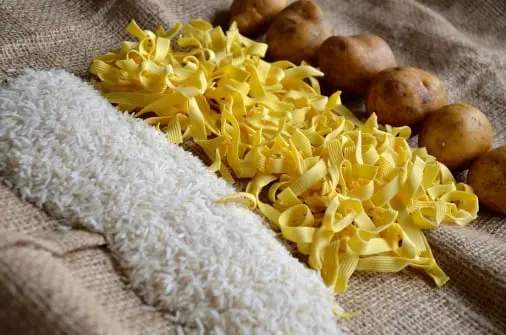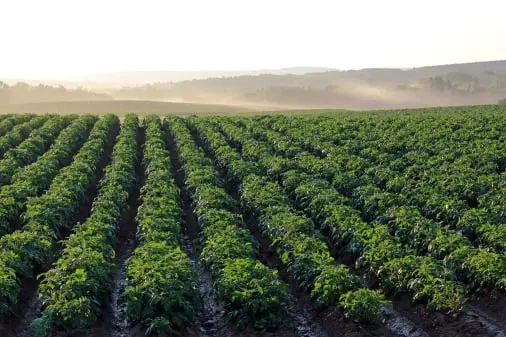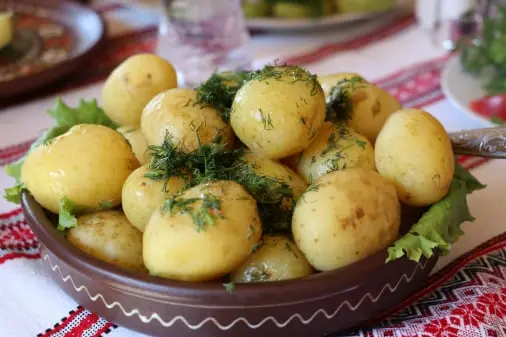Potato traceability app:
Potato traceability app manages full potato packing management, potato inventory traceability, storage, orders & sales, shipping & logistics, labeling, BOL, invoices, potato traceability audits and recalls and mock potato recalls.

Potato Traceability during production
View Traceability App Specifications.
POTATO TRACEABILITY
In recent times, food producers have developed an extensive capacity to track the flow of food along the supply chain, though individual systems vary. Some traceability systems are deep, tracking food from the retailer back to the farm, while others extend back only to a key point in the production process. Some are very precise, tracking food products to the exact area of a field where they were grown, while others are less accurate.
Traceability systems tend to be motivated by economic incentives, and not by government traceability regulations. Companies build traceability systems to improve supply-side management, to increase safety and quality control, and to market foods with certain claims – such as whether a type of food was produced without genetic engineering. The benefits associated with these objectives include lower-cost distribution systems, reduced recall expenses, and expanded sales of high-value products. In every case, the benefits of traceability translate into larger net revenues for the company.
POTATO INVENTORY TRACEABILITY
But traceability is only one side of the coin. Tracking food in the production process does absolutely nothing unless the tracking system is linked to effective control procedures.
The first step to traceability is labeling. While most farms are not required to label each piece of produce they sell, processors prefer to work with farms that label each container that leaves their store. In addition, if the farm uses barcoding technology in its labeling process, it makes traceability more effective and efficient.
Using barcode labeling, processors can track potatoes from the moment they are leaving the warehouse, as each pallet is scanned and placed onto a truck for delivery. Advances in RFID technology and telematics systems allow processors to record every movement of each batch.
Tracking products during the delivery phase is important not only to ensure products are delivered on time, but tracing a series of additional variables helps eliminate potential product damage or food spoilage in transit—preventing recalls and lost revenue.
Did you know that nearly 5,000 varieties of potatoes are being cultivated around the world, each of which comes under one of the eight or nine broader categories of taxonomic species?

Potato packhouse hygiene checklist
Potatoes were originally cultivated in parts of modern South America and were brought into Europe by Spaniards who invaded the region in the second half of the 16th century. The popularity of this tuber increased widely across the continent and further into both eastern and western parts of the world. Around the world, this versatile vegetable is cooked and served in numerous ways and is also a key ingredient in some alcoholic beverages.
Presently a major non-grain food crop and the most widely cultivated tuber globally, potatoes often travel from one part of the world to another to claim their coveted spot on store shelves and dining tables. Nonetheless, how do traders, retailers and consumers know where these potatoes exactly come from? How can potato growers assure them of the produce’s quality and safety?
ADDRESSING THE ROOT OF THE PROBLEM
The quality of the potato and its nutritional value is determined not only by how it is produced, stored and handled by various actors along the supply chain, but also by the quality of seed potatoes used to cultivate them. Some of the finest varieties of seed potatoes in India originate from the state of Punjab. A state well-known for its high-quality seed potatoes, nearly 70% of its produce provides for the seed requirement of other potato-producing states including Bihar, Uttar Pradesh, West Bengal, Gujarat, Maharashtra, Madhya Pradesh, and Karnataka.
However, only less than 1% of all seed potatoes produced here are currently those certified by the Punjab Seed Certification Authority, which makes it extremely difficult for potato growers to differentiate genuine seeds from spurious ones. The sub-par seed potatoes sold in the name of Punjab-grown seed potato is also severely impacting the credibility and the brand value of the authentic, high-quality seeds.
ESTABLISHING THE AUTHENTICITY OF PUNJAB-GROWN SEED POTATOES WITH TRACEABILITY
With the aim to expand the certification process and include more seed potato growers, the Punjab Agri Export Corporation (PAGREXCO) has recently partnered with global agri-tech provider CropIn. This collaboration will enable them to leverage state-of-the-art AI-powered technology to enhance seed potato production in the state and further establish a first-of-its-kind ‘Seed Potato Traceability’ in the entire value chain.

Potato Traceability
CropIn’s advanced farm data management solution will empower farmers to capture several parameters through every stage of production and monitor them systematically to produce superior quality seed potatoes. The PAGREXCO field teams will configure the best package of practices for each seed variety on CropIn’s platform, and will also receive real-time intelligence about local weather, crop growth, crop health, potential pest infestations, and crop diseases. This will help seed-potato growers in Punjab to cultivate superior quality seeds and improve their efficiency. Finally, CropIn will also facilitate two-way communication between PAGREXCO and these farmers, allowing managers to share important plans, advisories, and instruction videos, and facilitate for farmers to have instant access to the PAGREXCO team.
Capturing farm data at critical points establishes end-to-end traceability to the life cycle of seeds. Following tests for quality assurance and certification by PAGREXO, unique QR codes are printed on each of the seed potato packets during the packaging and warehousing process. This will enable buyers to trace the origin of the seed potatoes and determine exactly where the seeds are coming from, how the seed potatoes were cultivated, and whether they are PAGREXCO-certified or not.
This traceability feature plays a vital role in curbing the sale of counterfeit, low-quality seeds under the name of Punjab-grown seed potatoes. It will also prevent the mixing of high-quality certified seeds with sub-par ones that result in low yields and poor ROI for potato growers. While on the one hand, it boosts credibility for PAGREXCO’s brand name and consequently promotes farmers’ trust in its products, it also enables farmers registered with PAGREXCO to fetch a premium price for their certified seeds on the other.
The agrarian state of Punjab has taken a major step towards value addition in its fresh produce, with the introduction of a blockchain traceability-based certification system.
The system, which allows for instant tracing of the entire lifecycle of food products from origin through every point of contact to the consumer, has now been introduced for potato seed. With more growers opting for it, it will be introduced for most of the organic produce grown by around 5,000 farmers in the state.
“This certification will enhance the credibility, efficiency and safety of the produce, especially in these times of consumers’ sensitivity in knowing the disease-free origin of their food and its entire journey from farm to fork,” said Manjit Singh Brar, managing director, Punjab Agro Industries Corporation.
It is PAGREXCO, a subsidiary of PAIC, that is implementing the blockchain traceability-based certification system for potato seed during the current rabi season.

Potato Supplier Traceability
LOCAL POTATO TRACEABIILTY
Punjab is among the largest producers of potato seed in India, with the production this year pegged at 6.25 lakh tonnes. The seed produced in the state are sent all over the country, and this year, it is expected to garner Rs 1,000 crore business for the state’s potato seed growers (getting a price of Rs 16,000 per tonne).
Sukhjit Singh Bhatti, a leading potato seed producer based in Jalandhar, told The Tribune that this year business was good, and the blockchain traceability certification will bolster sales further. “With the introduction of traceability certification, more farmers will come into the formal sector for selling produce,” he said.
PTI, or Produce Traceability Initiative, is a system that allows the Food and Drug Administration (FDA) to trace a potato back from the consumer who bought it to the very field it came from within 24 hours. Successfully accomplishing this goal requires a series of computer software and hardware to be in place; computer programming that helps manage information printed on product labels that help make the tracing back of the product possible.
To keep things as simple as possible, Wisconsin growers worked together to pick one PTI vender. Not only did doing so prove to be the most cost-effective option, but it also was convenient for growers to work with one company versus several. This team-oriented approach really put the Badger State on the map. By working together, Wisconsin accomplished more in a short amount of time, which ultimately allowed each grower to save time and money.
Now, WPVGA offers each grower involved with PTI access to a Virtual Private Network (VPN). This VPN gives growers remote access to information from various shippers, which they need to print their product labels in a timely manner. It’s an extra step Wisconsin’s potato farmers are doing to ensure the produce they put on retail shelves, and eventually on your family’s plates are of the highest quality. It’s one more reason why buying local is the best way to go!
Being able to track produce back to the field regarding food security and quality, does not only support buyers and processors, it also helps farmers to identify problems and improve their yields in the following years. This use case opens data flows between stakeholders in the supply chain as an important step towards smart digital farming. The information and caliber measurments are gathered throughout the entire season through sensors mounted onto machinery, in addition to soil mapping performed by drones or satellites. Leveraging it enables potato processing companies to optimise logistics to ensure the continuous quality of their activities. Besides the technological components applied, this use case also addresses the growing demand for traceability among consumers in terms of food safety as well as quality.
POTATO TRACEABILITY SYSTEMS
A BUSY HARVESTING DAY
We visited this use case at one of their testing sites in Belgium during the busy harvesting season. The AVR Puma 4.0 four-row potato harvester and a fully loaded trailer pulled by a tractor were just returning from the field with the last harvested potatoes.
Show more
MEETING CHANGING CONSUMER DEMANDS
Market surveys indicate that the consumer profile is undergoing radical changes and a much more critical consumer is emerging. The categories are shifting from age-related groups that make dietary choices based on family circumstances to groups that make their selection on the basis of individual behaviour and quality demands.
Show more
DRONE-BASED YIELD PREDICTION
In collaboration with Aurea Imaging the use case explored the possibility of yield prediction based on drone data such as soil moisture mapping, topography, emergence mapping alongside growth monitoring.
Our sweet potatoes are put into our traceability software from the moment they are harvested and enter our facility. As one of the only sweet potato shippers that is fully PTI compliant, we are able to pinpoint the location of our products from the field, packing and shipping through barcode technology. The software we utilize also allows us to electronically notify our customers when products leave our facility.
Each product that leaves our facility contains barcode traceability information including case-level and pallet tag barcodes. We are able to provide hybrid pallet tags on request.
We are committed to staying ahead of the curve when it comes to traceability are constantly involved in committees, attending training seminars and participating in courses to educate ourselves and stay updated with the most effective means of traceability.
PTI Case Tag
Case-Level Tag Information
GTIN Produce #
Product Grade and Count
Voice Pick Code
Repacking Lot ID
Julian Date
Product of USA, Canada, Australia, New Zealand, UK.
Pallet Tag Information
Product Description
Quantities
Date Packed
Repack Lot ID for traceback
Hybrid Pallet Tag
Barcoded tag that translates all produce and lot combinations on a pallet. Done per request for customers. We are currently one of the only sweet potato packers able to complete this traceback step.